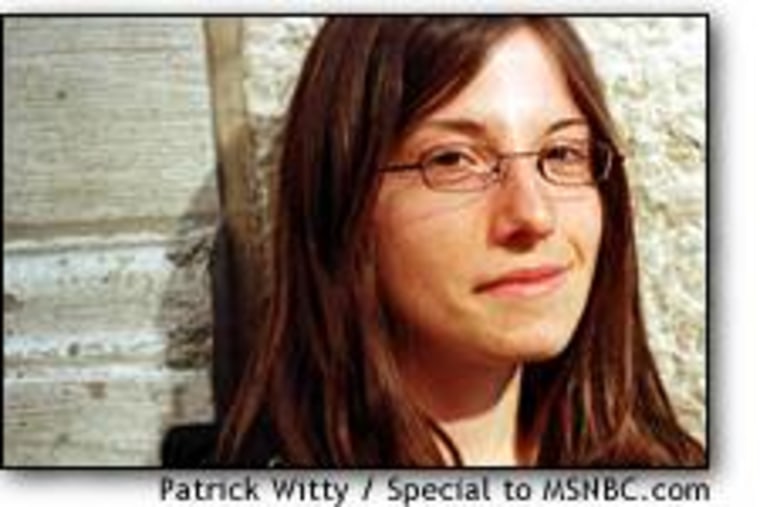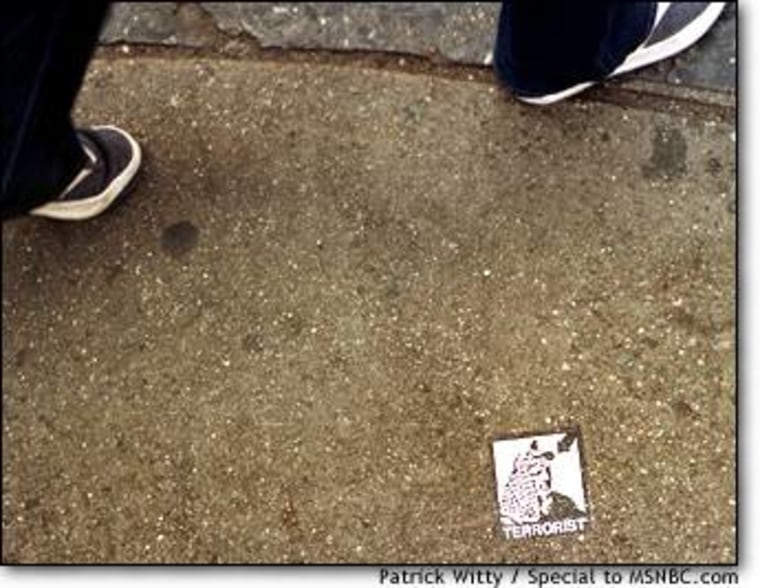On a crystal-clear spring day, business is humming on New York’s Upper West Side. But just underneath the surface in this affluent Jewish American community, there’s a palpable sense of personal distress — not only about the recent carnage more than 5,000 miles away in Israel, but also about how the United States has reacted to it.
Whether in a bustling kosher deli on West 72nd Street, the cozy café serving up cappuccinos next door or the thoroughly modern Jewish Community Center — still under construction, but open for business a few blocks uptown — many of the Jews who call this well-trodden area of Manhattan home feel aggrieved by the U.S. calls for Israel to pull out of the West Bank.
“It’s quite hypocritical,” said Matt Medwick, a young doctor who lives just off 72nd Street. “Bush is sending troops over to Afghanistan and bombing the entire country searching for one man, but then he said to Sharon that he can’t defend his own country after days and days of attacks.”
Fighting back
Others, like retired electric company controller Betty Feldman, who shops at one of the neighborhood’s kosher delis, understand the political tightrope the Bush administration is trying to negotiate right now, but still have a deep-down conviction that Israel — as the home of the Jews — must protect itself, no matter the wider consequences.
“I understand what Bush is saying,” said Feldman.
“However, in my gut, I think we should fight back. When I was called a dirty Jew, I fought back, so that’s my thinking.”
Not every Jew in America is happy with Israeli leader Ariel Sharon’s massive military assault on the West Bank, however.
American Jewish doves led by Rabbi Michael Lerner of Berkeley, Calif., and Cornel West, a Harvard professor of African-American studies — who wrote a book with Lerner titled “Jews and Blacks: Let the Healing Begin” — have formed the Tikkun Community, a movement that speaks on behalf of what it said is a silent majority of American Jews who oppose Sharon’s tactics.
But a recent Tikkun rally in Washington, D.C., that drew a mere 300 boomer-aged protesters showed how far Tikkun has to go before it can compete with a renewed and passionate pro-Israel sentiment that is bringing thousands of American Jews from all walks of life into the streets.
A struggling 'homeland'
On the Upper West Side, those whom MSNBC.com spoke with uniformly shared a discontent with the current American pressure on Sharon, suggesting that in this time of crisis for Israel, any disapproval of the current Israeli leadership must be overlooked for the sake of their “homeland’s” very survival. “I think everybody feels a lot of pain for the Palestinian population. But Israel, as any nation, has a right to defend itself and protect its citizens,” said Aaron Horwitz, a sophomore at Columbia University. “I want to tell Bush … we need to fight together if we want to win.”
Fellow student Lara Weinstein agreed. “We can’t afford this ambiguity,” she said. “I just wonder how the U.S. can really help end the violence in the Middle East when it’s not willing to take a position that’s really fair, and that recognizes Israel’s interest and security.”

Weinstein, who recently returned from a Birthright Israel trip — a program “designed to diminish the growing division between Israel and Jewish communities around the world” — said that anyone who’s a “hyphenated American” will see their interests clash with their government’s from time to time.
“According to the books, I am a U.S. citizen and my allegiance is first to the U.S.,” she said. “But would I like to see the U.S. be more unambiguously supportive of Israel? Absolutely.”
Still, Weinstein and many others in this part of New York insisted that, even though they disagree with the recent U.S. reprimand of Israel, they don’t feel threatened as Jews by the policy shift.
“I don’t feel betrayed by it,” said Paul Whitman, a partner at Fischer Bros. and Leslie, a kosher deli in the heart of the Upper West Side. “I understand the position and despite some concerns, I think the country is still very much supportive of Israel.”
Proud to be both
"I think the two countries are closely aligned, democracy to democracy, and that fundamentally Bush supports Israel,” said Nancy Miller, a mother picking up her son from preschool at the Lincoln Square Synagogue a few blocks away. But Miller also admitted that she’s disappointed with Bush’s current hard line on Israel, which she said is unfair. With family and friends there, she has deep emotional ties to the country.
When asked what she feels she and other American Jews can do to support their brethren in Israel, Miller said, “I ask myself that question a lot. The main thing I do is call the White House and e-mail them.”
Medwick, the doctor, also thinks it’s the responsibility of American Jews to speak out when they feel America isn’t being supportive enough of Israel. But rather than feeling torn between his allegiances to the two countries, Medwick said that at times like this, he feels even more American.
“I think you can be a great American citizen and still disagree with the government,” he said. “That’s democracy and freedom of opinion. If I support Israel’s right to defend itself; it’s not against American policy, it’s just pro-Israel.”
Perhaps Elena Joffe, a marketer of educational video tapes who’s lived in New York for 11 years and has family and friends in Israel, summed it up best: “I’m very proud to be American and I’m very proud to be Jewish, with allegiances to Israel as well.”
Frustration mixed with fear
Still, her voice betrayed a note of concern when the discussion shifted to recent anti-Semitic attacks in Europe. “To see what’s going on in the world is very scary right now,” she said. “And the fact that America is putting pressure on Israel, it’s very disturbing.”
“I hope a new wave of anti-Semitism won’t come here now,” Joffe added. “But could it happen here? I don’t know. People didn’t think it could happen in Europe in the ’40s either.”
Whitman, the deli owner, also expressed a degree of nervousness. “When you hear about kosher businesses being fired at in Europe, it makes you think twice,” he said.
Ultimately however, Whitman believes that America is a world away from the troubles in Europe. “I think we have a country that teaches us to be tolerant of all of the members,” he said. “We have a multinational heritage here.”
Whitman is also on New York’s Board of Education, where he said he and his fellow members are always pushing for a multicultural curriculum. “I think that is what will hold us together in the end,” he said.
Jewish-Arab tensions simmer
But what about right now? With Israelis and Palestinians killing each other every day in Israel, how do the Jewish-American and Arab-American communities view each other?

Whitman acknowledged there are tensions. The current situation “has certainly had an impact on people and it does create suspicions and anxiety,” he said as he recounted how a Middle Eastern restaurant in his neighborhood closed down after Sept. 11 simply because people were nervous about going in. “I just felt horrible.”
Corinne Hodes, a teacher buying some supplies at the West Side’s Judaica shop, expressed similar sympathy for fellow Arab-Americans, despite her anger at the Palestinians in Israel. “I feel for them, I really do,” she said. “I don’t see them as guilty at all. In fact, I think they very well may end up being innocent victims.”
Joffe, however, said Arab-American leaders hadn’t been quick enough to condemn violence in the Mideast.
“I don’t think people should be discriminating against the Arab-American community, but I do think the leadership of the Arab community in the U.S. should speak out against suicide bombings instead of saying it’s justifiable because of what’s happening in Israel. So, I’d have to say I’m a little torn,” she said.
Relationships suffer
Horwitz, the sophomore at Columbia, said he studies Arabic and invites Muslim friends to his Sabbath table. “But look, there’s tension sweeping in,” he said. “I feel it in my relationships with people, and there’s definitely a strain that makes things very uncomfortable right now. The situation in the Middle East is very sad and it’s very sad that things have become polarized to the extent that they have.”
Weinstein, who is completing her degree in U.S. history, said she has no “particular problem” being around Muslims either, but asked herself a rhetorical question: “Would I go out of my way to be with them?”
Her answer underlines what may be the inevitable fallout of the Middle East crisis here in America: “No I don’t think so,” she admitted, before adding, “If I found myself in a room with a bunch of Muslims, I’d wonder what I was doing with my time when Israel is in the crisis it’s in today.”
MSNBC.com’s Ursula Owre Masterson is based in New York City.